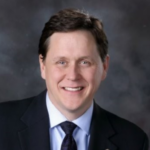Thank you Chairman Marquart and members,
My name is Matt Dean and I am a Senior Fellow for Healthcare Outreach at the Heartland Institute. Heartland is a nonpartisan, nonprofit organization that works with policymakers in developing free market solutions.
I would like to thank Rep Schultz for her work to make sure all Minnesotans have access to affordable care. That goal is shared by every member of the House.
When this bill was heard in HHS last month, I noted that the DE amendment to HF11expanded the goals of the bill and pushed out time horizons beyond the reach of fiscal analysis.
In that committee, legitimate concerns were raised that this bill moves people who are currently ineligible (such as people who are here illegally) and those who may have employer based, or individual insurance to MNCare. That migration could spike individual health insurance premiums and limit their availability. Hospitals would face more patients with MNCare’s low reimbursement, causing further cost shifting and financial distress.
The tax committee would be wise to focus on the long-term goal of the Healthcare access fund and the regressive 2% provider tax that feeds it. The provider tax was set up in the 1990s to support the MNCare program. When MN expanded Medicaid under the ACA, the entirety of that group was covered by Medicaid. MNCare is almost entirely covered through a mix of federal and state general fund spend, and currently premiums only support 4.1% of HCAF spend. The provider tax has become a spigot without a bucket. That will change next year, the structural balance will go into the red without adding this bill.
The latest Auditor’s report from August, 2021 showed that MNCare was missing nearly one-in-five enrollees who misstated eligibility and in 2018, simply wrote off $30M in uncollected premiums because it was too hard to collect. In short, we are really bad at calculating, sending out and collecting health insurance premiums.
While we welcome ideas to provide businesses and individuals economic relief, Heartland encourages members to look at increasing care through solutions like direct primary care contracting and allowing more flexibility in purchasing healthcare plans that give the consumer more flexibility and focus government-based plans on those truly needy who cannot participate in the private market. Thank you, Mr. Chair and members.
Nothing in this testimony is intended to influence the passage of legislation, and it does not necessarily represent the views of The Heartland Institute. For further information on this and other topics, The Heartland Institute’s website provides a great link to many policy resources.
The Heartland Institute can send an expert to your state to testify or brief your caucus; host an event in your state or send you further information on a topic. Please don’t hesitate to contact us if we can be of assistance! If you have any questions or comments, contact Heartland’s government relations department, at [email protected] or 312/377-4000.

